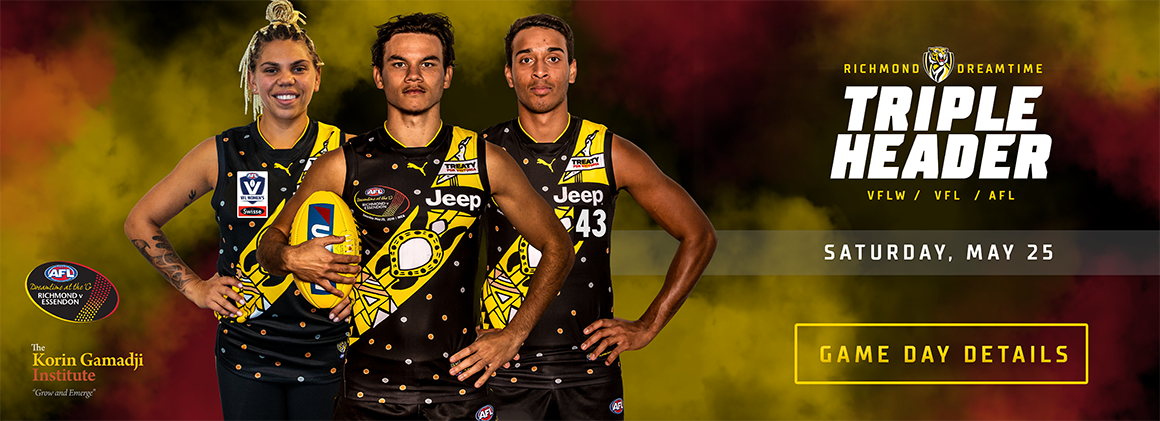Konrad Marshall sat down with exciting, young Richmond small forward Daniel Rioli earlier this month for the next edition of his series of long-form features on current Tigers from the author of Yellow & Black - A Season with Richmond.
It’s well known that Daniel Rioli takes to the footy field with his wrists bound in athletic tape, marked up in Sharpie, two words scribbled in black: Run, Chase.
As you can probably imagine, those words are something to focus on when he needs to centre himself – when his game is drifting from where it should be, when he needs a nudge to remember his role, play to his strengths and do what he does best.
But in truth he seldom needs that reminder, because Run, Chase is a part of Daniel Rioli – intrinsic to the who, what, why and (most importantly) where that make him him.
He grew up on the Tiwi Islands, north of Darwin, specifically on Melville Island, the bigger but less populated of the prominent pair, in a place called Garden Point, part of a town called Pirlangimpi, with no traffic lights and a bare handful of cars. It’s nice and hot there. Saltwater country. It’s teeming with life, too – all of it waiting to be stalked and tracked, spotted and caught. Run, chase.
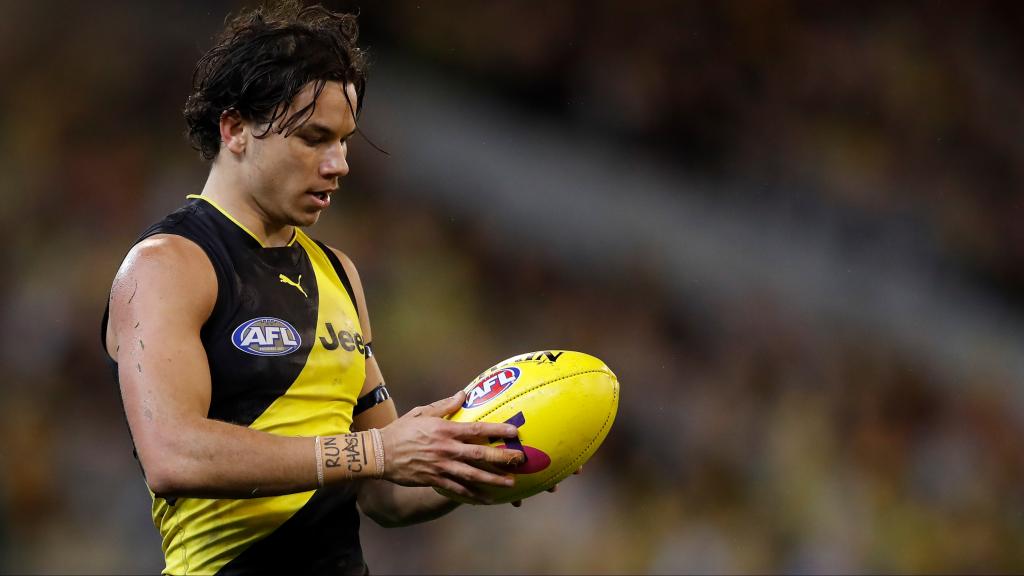
For instance, the exact moment he heard that his big cousin Cyril had been drafted, young Daniel, 11, was out “shooting mangoes” – standing beneath a tall tree, hurling hard green fruit up at soft ripe orange ones. And almost a year later, in the days before Junior helped Hawthorn win the 2008 Grand Final, Daniel was out in the roots and sludge of a mangrove swamp, where mud crabs crawl, mussels grow, and the cone-shaped snail known as the longbum waits to be plucked and cleaned, cracked open, cooked and devoured.
In the warm pastel blue waters of the Timor Sea, barramundi is his favourite fish. You need live bait to land them – Rioli favours mullet. Snapper and salmon are plentiful there, too, but squid is the better lure if you want to catch the biggies and really fight with that reel. Run, Chase.
This is what Rioli does most when he’s at home these days, ripping at the cord of an outboard motor and powering off on the surface of the sea. Or just doing like he did as a kid – walking the white beaches with a line in hand, throwing the thin filament into the water. “You just toss it out, watch the line take off in the sand, and you know you’re on,” he says, smiling. “You pull it in with your fingers, maybe wrap it around your hand. You get a few cuts. I was probably three when I caught my first fish that way.”
Tiwi is bigger than you might think, and more diverse, so he looks inland for prey as well, hunting in the sedgelands and saltmarsh, and the red dirt under acacia shrub. There are treeless plains and stands of paperbark and monsoon rainforest. Wallabies are good eating. Quail, too. Bush pigs and water buffalo are a challenge, although Rioli is more than handy with a rifle.
“But I moved away from that when I was 14,” he says now, in the air conditioned Meeting Room 2 at the Richmond Football Club. “I left to go to boarding school in Ballarat. I wanted to play AFL.” Run, Chase.
Can you even imagine?
Rioli left the heart and heat and humidity of home to begin year 9 at St Patrick’s College – an old Christian Brothers school, founded in 1893, sitting in the coldest city in Victoria. All Rioli knew of the school was its football pedigree, but that was enough. So he got on a plane one morning at 7:30am, headed for Darwin, then Tullamarine, and then onto a shuttle bus and out of the city into the night. He arrived in darkness. It was 8 degrees outside. He was wearing shorts, a singlet and thongs.
“It was the longest day ever,” he says, softly. “I had no idea where I was. No idea it would be so cold. I was on the bus just thinking ‘Where am I going?’”
TICKETS Secure your seat for our traditional Dreamtime at the ’G clash against Essendon
He called his mum quickly, and often, in those first few days and weeks. He knew no one, he says, and he hated the weather. He rang her in tears more than once.
Just stick it out, she told him. Just hang in there.
And so he did, and he made a friend. Then another. There were a few other Indigenous boys in his year level, and they became mates. But that makes the transition sound simple and smooth and linear, when in fact it was constantly trying, with regular hurdles and setbacks. His mates eventually left, unable to adjust. “I wanted to leave, too, but Mum and Dad wouldn’t let me do that,” he says. “I had to stay. The sacrifice was worth it in the end – look where it got me now. I’m 22, and this is my eighth year away from home. But home is always going to be there – home’s not going to move.”
As much as he was chasing a career, there were also reasons to run – “to get out of Tiwi as soon as possible” – and he points them out now, without my asking. Alcohol problems. Drug problems. Poverty. Suicide. “If it wasn’t for Mum and Dad telling me to stick it out, I don’t know what I’d be doing right now. Probably at home, making no money, living off my parents. It would be a pretty hard life, pretty stressful. I’m just so grateful.”
His coach says the same thing, recounting how Rioli began at Ballarat with a small cadre of Indigenous pals. “One by one the others went home,” says Hardwick. “But Daniel toughed it out. And really, that’s why he succeeded.”
GUERNSEY Learn more about Richmond's 2019 Dreamtime Guernsey designed by Daniel Rioli and his parents
But the team at Tigerland kept checking in on him, noting his awareness at stoppages in a Laguntas game, some insouciant moments in school football, some skill at speed in TAC Cup footy. There are players who don’t stand out as fully as possible in junior pathways, and Rioli was perhaps one of them. His light frame was somewhat unsuited to freezing, muddy matches in Ballarat. But it left a question hanging in the air: How would he play in AFL conditions, on perfectly manicured surfaces, in vast stadiums protected from the wind? What could he do to opponents on that stage?
At the National Championships, he got his chance. Clarke watched Rioli with Francis Jackson on a beautiful sunny day in Southport. Rioli had maybe 15 touches. “But he just did a few things where Francis and I looked at each other and went, ‘Wow’. I remember he went to kick once, and just stopped dead as a guy was coming across the front of him, paused and held the ball that split second, then hit up a man with his kick. He had that game sense – that footy IQ. I likened him to Shane Edwards.”
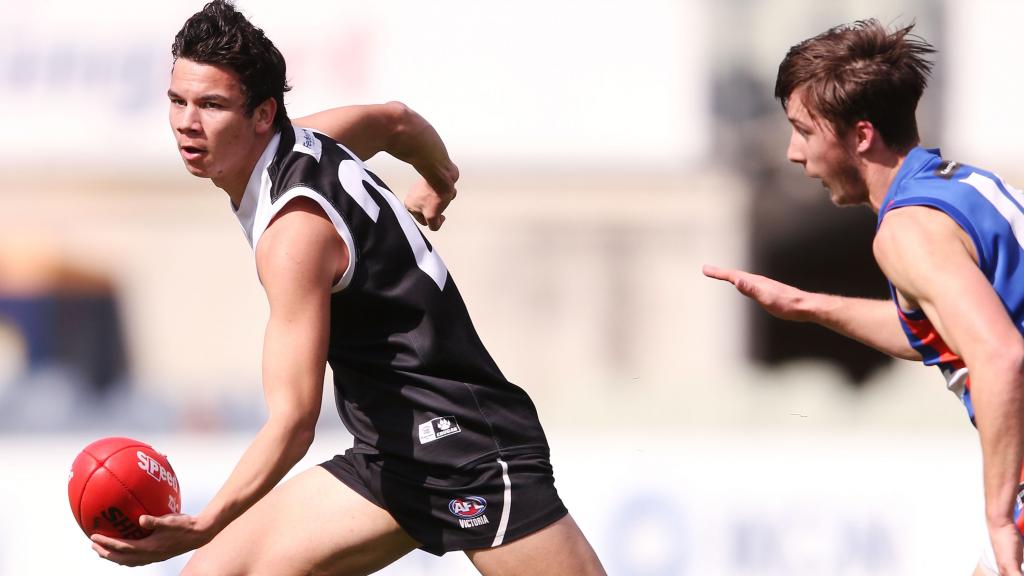
Next, playing for the Allies against the Australian Under 17 team, on the MCG, Rioli let his full highlights reel run, kicking four goals in the AFL Grand Final curtain raiser. He says he felt “like an ant” that day. He felt tiny, but with so much room to move – so many holes to dart in and out of, and weave between. So much space in which to play with the footy.
What the club hadn’t yet seen, however, was his ability to find uncontested ball, or follow the Sherrin for long periods in an “up and back” match. Rioli was playing mostly as a deep forward, meaning his GPS figures were corrupted. Any fears about his tank were assuaged though at the draft combine, where he blew away competitors with his top end speed, and repeat sprints, elite agility, clean hands, strong beep test and superb time trial. “He had the full combination,” says Clarke. “Repeat speed, and power, with a massive motor.”
One of the biggest items on the coaching wish list at the time was a high pressure fast forward who was good on the ground. “I’ve said it before,” says Clarke, “but we had a round hole, and Daniel was the perfect round peg.”
The interview was the sealer that saw him taken with pick 15. Clarke was there with Jackson and the club’s psychologist, Kim Stephens. Rioli wore his school tie and blazer, and spoke to them for an hour and a half. “He spoke so honestly and strongly. You could tell he loved his family and his culture and his home, but that he wanted to be away from that right now. He was just intent on doing what he needed to do and, honestly, to be that shining light for his family.”
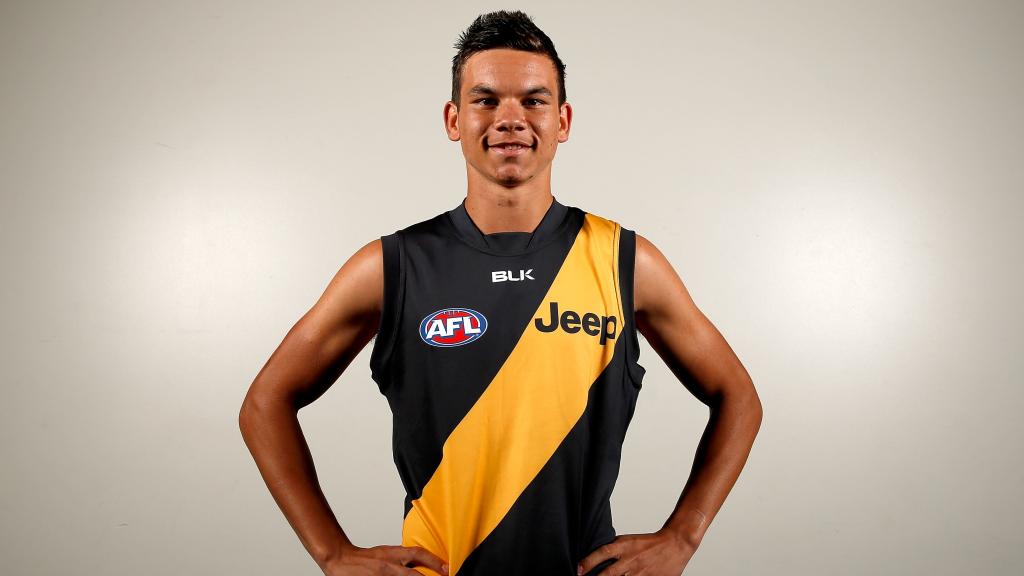
He lived with Hardwick and his family, famously staying almost three years as a boarder and extended family member in their suburban setting. “Dimma and Danielle offered, and I didn’t want to be rude and say no,” Rioli says, grinning. “It was a bit scary at first but they’re such a good family. Immy and Izzy and BJ are great friends of mine now. It was the best time in my life.”
Hitting the football program was difficult, and not just the exhausting physicality. The meetings were at times incomprehensible. He sat dumbfounded by the terminology – listening blankly to coaches talking in coded phrases. “In my first year I didn’t like to get help with those words and what they meant. I was too scared to ask someone. I didn’t want to be that person who doesn’t know anything.”
He found help in the form of Mark ‘Choco’ Williams, and Shane Edwards. And as he began going through game footage with line coaches, and listening more intently through Match Review and Opposition Analysis, the lexicon began to seep in and be understood, almost by osmosis. Now Rioli can help others, mentoring younger players as they come into the system. “But I feel like they get it! Like, was I just slow?” he says, laughing. “Sydney Stack comes in from WA, and I thought he’d be a bit shy like Shai Bolton, but he’s loud and confident and made a big impact, and understands the game.”
Rioli is putting on weight now, too, in an effort to run through the midfield – building a hardened body that can stand up to the rigours of that high impact, heavy collision position – even if only to give a stalwart onballer a five minute rest. “When I came to the club I weighed around 68 kilograms. I was light,” he says. “Dimma would say ‘Go eat Maccas, whatever, but put on that weight’. Danielle and Dimma used to cook me spag bol, and they’d always say ‘Have seconds, thirds – get it into you!’ Now I’m 76 kilos, and stronger through the hips.”
The Sir Doug Nicholls Round is upon us this week, of course, and so I want to ask Rioli about the word “magic”, and the way it’s so casually slapped upon the acts of brilliance performed by Indigenous players, and how it’s possible that this sells short the effort that went into manufacturing those moments. It’s a point that’s been made before by others, but we tend to take it as a given that a superbly skilled white footballer has somehow earned his talent through devoted repetition, while the ability of his indigenous counterpart is more of a genetic gift. Hard work versus dumb luck. Stylish versus freakish.
“It is always directed at us. You don’t see people saying that about non-indigenous players,” Rioli says. “But it’s a hard question to answer. My grandfather, Maurice, used to play, and they used to call him ‘Mr Magic’. So if I do something good and they say it’s magic, I don’t have an issue with that. I just hope they know there’s hard work, too. We have to put in to make it happen. Maybe people don’t see that.”
On Saturday night, at the annual Dreamtime game against Essendon, fans will see a new part of Rioli – in a form he cherishes. The jumper the team will wear is one designed by him during the off-season, when he was at home. He drew the motif with his dad, Bradley Rioli, and his mum, Belinda Punguatji. The artwork features a turtle, which is his dreaming and spirit animal – his totem – and there are two spears, representing men and power. A line runs through the centre – the pukumani pole of his people.
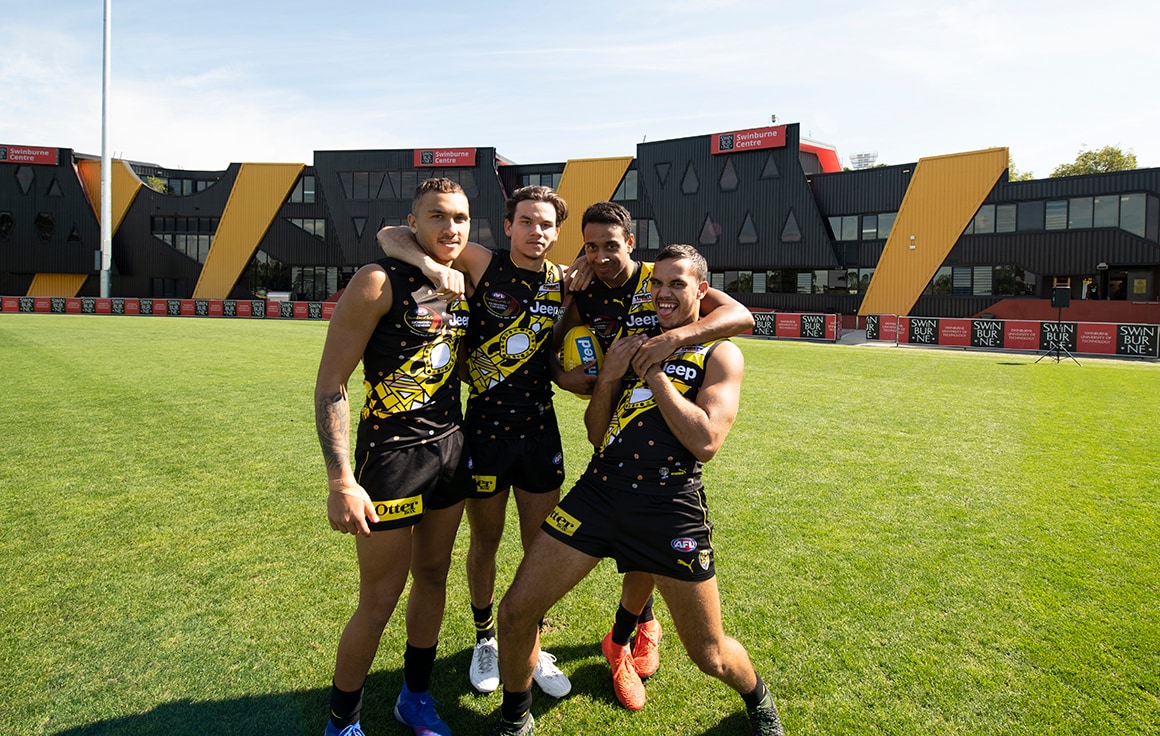
He would love to run out in that Guernsey. He’d love that turtle of his to fly across the bright green grass in the black night, while he lays a run down tackle. That’s his favourite thing in footy, particularly against a quick player, someone like the Bombers defender Adam Saad. Saad caught Rioli holding the ball in a game last year, and it burned the Tiger all throughout the night. “I’m getting you back, mate,” he thought. “I’m getting you back.” Run, Chase.
And he did. With 30 seconds left in the match, Saad got the ball. “I could hear the crowd go off when he got it, and I knew I had to get him. I took the chance. I remember Shedda trying to reach for him, and Jack Graham, but they missed, so I just went past them, grabbed him, laid that tackle, and the crowd went nuts. That gets me up and about. That’s my role.”


